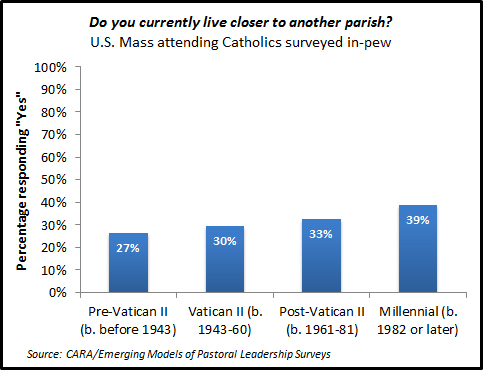As a survey researcher often working on national polls of self-identified Catholics, I frequently hear the remark, "But what about the Catholics in the pews?" Finally, I can say we've got a poll specifically for that as well.
CARA and the Emerging Models of Pastoral Leadership have been conducting a major study for the last two years that aims to get the clearest portrait possible of what is going on in American parishes. The final piece of this project is a series of surveys—still in progress—of parishioners, in-pew during Mass, in a random sample of U.S. parishes (...CARA has also conducted similar surveys in many self-selected parishes and dioceses that have come to us for assistance). Currently, the Emerging Models data includes nearly 11,500 responses from Catholics who took a survey at Mass (...CARA's sample from parishes and dioceses commissioning surveys includes more than 370,000 respondents). Tomorrow, CARA researcher Melissa Cidade will give anyone interested a sneak peak (go here to sign up for the webinar) at what Catholics in the pews have been saying in the Emerging Models project parishes.
One of the most surprising aspects of the results so far has been how positive Mass attending Catholics are in their evaluations of their parish (...yet there are also many interesting sub-group differences here as well). I always remind people that many respondents in these surveys have chosen to be a part of the parish they are evaluating. One way we know this is that 31% of parishioners report that they are not attending the parish closest to their home—they may even drive right by another parish on their way to Mass. Some Catholics are clearly going "shopping" and finding parishes where they feel they fit in well or where they feel their needs are best met. Of course with a few exceptions parishes are territorial (Can. 518; Can. 100-107) but there are clearly unofficial "market forces" at work as well and these tendencies may be gaining strength.
The figure below shows the breakdown for the question "Do you currently live closer to another parish?" by generation. Recall, all respondents are taking this survey during Mass at the parish they attend (we also ask them if this parish is their primary place of worship. In CARA's commissioned surveys we also ask for ZIP codes). A "yes" response to this question provides an estimate for how many "drive by" Catholics there are. Nearly four in ten Mass attending adults of the Millennial Generation (born 1982 or later) is not attending their local parish (to be fair, in some cases, the closest parish may not be their territorial parish given the structure of boundaries). A third of Post-Vatican II Mass attenders (born 1961 to 1981) responds similarly. Even more than one in four Pre-Vatican II Mass attending Catholics (born before 1943) is potentially passing by a parish to attend another.
In an era where more parishes are closing than opening, these market forces may be putting pressure on some parish leaders. The phenomenon may also be eroding some of the neighborhood culture of Catholic parish communities (in CARA's commissioned in-pew surveys we have discovered parishes that are drawing Mass attenders from other dioceses—most often in the Northeast). At the same time the survey data seem to indicate that this mobility may also make for happy parishioners.
For more information about Emerging Models see the report for the first phase of CARA's research released last year entitled, "The Changing Face of U.S. Catholic Parishes" (a single informant survey conducted with 846 randomly selected parishes, margin of sampling error of ±3.3 percentage points, describing the parish and its staff.). We are about to release a report entitled "Perspectives From Parish Leaders: U.S. Parish Life and Ministry" (here is the recorded webinar... stay tuned for the full-report) which is based on a survey of 532 parish leaders (staff, finance and pastoral councils, and other leaders) in 246 parishes from the first phase (margin of sampling error of ±4.2 percentage points).
Above photo courtesy of Christopher Lane Photography at Flickr Creative Commons.


